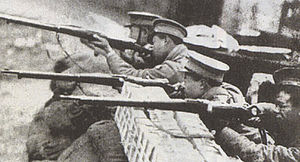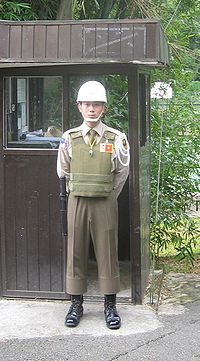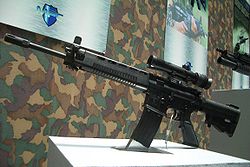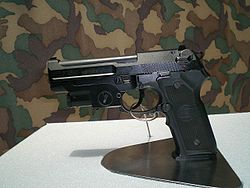- Republic of China Military Police
-
Republic of China Military Police 
Active 1913 - Present Country  Republic of China
Republic of ChinaBranch Military Police Size 16,000 (2004 est.) Part of Republic of China Armed Forces Garrison/HQ Taipei City, Republic of China Anniversaries December 12th Engagements Northern Expedition
Xi'an Incident
Second Sino-Japanese War
Chinese Civil WarCommanders Current
commanderGeneral He Yung-chien (何雍堅) The Republic of China Military Police (Chinese: 中華民國憲兵; pinyin: Zhōnghuá Mínguó Xiànbīng) is a military police body under the Ministry of National Defense of the Republic of China (ROC). Unlike military police in many other countries, ROCMP is a separate branch of the ROC Armed Forces.
Contents
History
Warlords Era
The Republic of China Military Police dated back to 1914. When the provisional president of Republic of China, Dr. Sun Yat-sen, took the office in Guangzhou, an internal security unit was established to enforce military discipline among the troops loyal to the Republic of China Provisional Government. This unit was later renamed Military Police and would gradually expands and become present-day Republic of China Military Police. In 1925, under the supervision of then general Chiang Kai-shek, the military police was expanded from a single company to a full battalion, and was attached to the Northern Expedition Forces the next year. In the next ten years, the military police gradually expanded into several regiments, and was active in purging the communist elements within the Nationalist government.
Xi'an Incident
On December 12, 1936, while accompanying Chiang Kai-shek on an inspection trip to Xi'an, members of Military Police clashed with Zhang Xueliang's elite bodyguards when the latter were sent to arrest the generalissimo. The military police were caught off guard and out numbered, and were soon overpowered by Zhang's force, who later arrested Chiang and his entourage in what is later known as the Xi'an Incident. More than one hundred military police became casualties in the brief battle. However, to commemorate the heroic actions of the Military Police, Chiang ordered December 12 to be the Military Police Day. This holiday is no longer observed by the Republic of China government.
World War Two and Civil War
During the Second Sino-Japanese War, the Military Police troopers sometimes found themselves clashing with the Japanese despite the fact that they were neither properly trained nor equipped for such combat tasks. In the January 28 Incident, Shanghai and Battle of Nanjing in 1932 and 1937, the Military Police put up fierce resistance against the Japanese forces, and suffered heavy casualties. The Military Police were also instrumental in operations behind Japanese line, and in time continued to expand under the direction of Nationalist Military. Military Police were also active in keeping the influences of the communists at bay, and were successful at quelling an attempted insurrection by the communists in 1941. The last task of the Military Police in the war was to provide escort to the Japanese delegates to arrange the surrender.
Full scale civil war broke out in 1946 between the Nationalists and the Communists; however, the Military Police were not as active in combat as they once were in the war against Japan. The Military Police were tasked to protect important governmental facilities from sabotages as well as political figures from assassinations. Furthermore, several Military Police regiments were involved in suppressing civil unrests in the newly acquired territories of Taiwan. The Military Police headquarters were moved to Taipei in 1950 following the defeat on mainland and evacuation to Taiwan.
Taiwan
After retreating to Taiwan in 1949, ROCMP units were put in charge of 2 main missions besides the typical law enforcement over other military personnel---co-locate with major ROC military units in order to closely monitor those units and to sound off alarm of military mutiny if necessary, and to protect the central government by having sentry outposts in all bridges and roads leading into Taipei with orders of blowing bridges and roads if necessary.
In 1970, under the advice from the US Military Mission to the ROC, the ROC Armed Forces reorganized all their regiments into brigades. On 16 March 1970, the Military Police Command formed up four regional commands from the original military police regiments: 201st regional command from the 101st Military Police regiment for presidential guards, 202nd from the 201st MP regiment for capital garrison, 203rd from the 202nd MP regiment in Miaoli, and 204th from the 203rd MP regiment in Tainan City. The ROCMP sentry outposts outside of Taipei was stopped after 1990s.
In January 2006, all ten security battalions under the Republic of China Air Force were transferred to the Military Police Command.
Functions
A military policeman on guard duty near the Cihu Presidential Burial Place, where Chiang Kai-shek is entombed.
From the 2006 National Defense Report, Republic of China Military Police performs
- Military functions:
- special security duties, including presidential protection,
- counter-terrorism operations,
- garrison security,
- enforce military discipline,
- support military operations,
- Supportive functions in civilian affairs:
- execute military justice and law enforcement missions,
- maintain public security,
- adequately support regional disaster prevention,
- response, and ensure social stability and national security.
Military
ROCMP is responsible for enforcing military law, maintaining military discipline, providing manpower support for the civilian police force, performing combat duty in times of emergency, providing security for certain governmental facilities such as including the Presidential Palace, and performing counter-terrorism and VIP protection operations. It is also responsible for the defense of Taipei, the capital city and political and financial center of the Republic of China.
Intelligence
Due to traditional and historical reasons, Republic of China Military Police still carry out intelligence missions in six categories of Security Investigations to fulfill its tasked functions:
- Special Services for presidential security and protection
- Politics
- Military
- Criminal Cases
- Foreign Affairs
- Social Order
These Security Investigations are mainly run by every regional investigation group, the mobile investigation group, and their superior unit: Intelligence Division of the Military Police Command. The main goal of these six Security Investigations is centered at the first one: Special Services for presidential security and protection. More practically, it is to satisfy the request from the Commander in Chiefs, the ROC President.
While performing its intelligence missions, Republic of China Military Police is submitted to the supervisory and coordination from National Security Bureau of National Security Council.
Law enforcement
In accordance with; Clause 2, Section 1 of Article 229; Clause 2, Section 1 of Article 230; and Clause 2, Section 1 of Article 231 of The Criminal Procedure Code of the ROC, the commissioned and non-commissioned officers, and the enlisted persons of the MP Corps have the authority to assist public prosecutors or to be commanded by prosecutors to investigate crime activities. In the other words, performing the authority of Judicial Police are given by The Criminal Procedure Code of the ROC to the Security MP troops in the regional Military Police units, and it is the same in nature as the polices performing the actual criminal investigations. Before the establishment and expansion of the mobile forces of special police corps in the ROC, Military Police troops were the main force to secure and prevent high-profile criminal activities, heavy violence, and frequent society disorders or riots. At present, Military Police troops are still aggressively working with and commanded by the district public procurator systems to investigate criminal cases. The Security MP troops are still one of the important forces that uphold the law and order of society in the Republic of China.
Because of the frequent military personnel rotations and the conscription system in the ROC, people within the regional Military Police units develop relatively fewer ties with local residents, in comparison with the local police departments. Also, the local police departments must answer to the corresponding local elected officials administratively but the regional Military Police units do not. In the cases of prostitution and human slavery, this makes the ROC Military Police the preferred law enforcement unit for the public prosecutors of all levels in the ROC, because of minimal information leakage or less interference from domestic politicians.
In cases of fugitive recovery, some public prosecutors mobilize the military police to handle large-scale searches or arrests because military police can provide massive manpower with good discipline and fewer gang-related interpersonal relationships.
Organization
Military Police Command (憲兵司令部) is responsible for all Military Police units and operations. It is subordinate to the Armed Force General Staff, the Minister of National Defense, and the Republic of China President. It includes internal units that are responsible for political warfare, units inspection, personnel, intelligence, operation, logistics, and communication. It is also responsible for the following units and divisions:
- Military Police School (zh-tw:憲兵學校, ja:憲兵學校 (中華民國))
- Military Police Regional Commands (x4) (指揮部)
- Military Police Armor Battalions (x2) (裝甲憲兵營)
- Artillery Battalion (x1) (砲兵營)
- Military Police Battalions (x19) (憲兵營)
- Security Battalions (x10) (警衛營): Specially tasked to guard military air bases or field.
- Regional Military Police Offices (x22) (憲兵隊): It is a battalion-size unit stationed in the urban area.
- Regional Military Police Investigation Groups (憲兵調查組): Administratively, it belongs to its corresponding regional office; operationally, it is controlled by the intelligence division(G2) of the Military Police Command.[1]
- Forensic Science Center (zh-tw:刑事鑑識中心)
- Chemical Forensic Division (化學鑑識組)
- Physical Forensic Division (物理鑑識組)
- Crime Scene Investigation Division (現場勘查組)
- Military Police Special Services Company, MPSSC (zh-tw:憲兵特勤隊): Code-named Night Hawk.[2] This unit is stationed at Wugu, Taipei. Little is known about this unit, since informations regarding it are classified by the Ministry of National Defense.[3] It was formed in 1978. It has been reported that some members have been trained by the Ranger School at Fort Benning.[4]
- Xindian Military Prison, New Taipei City (臺北新店軍事監獄)
- Liujia Military Prison, Tainan City (臺南六甲軍事監獄)
Equipments
Vehicles
Model Origin AM General Humvee United States CM-31 Armoured Vehicle Republic of China Harley-Davidson 883 Sportster United States V-150 APC United States Small arms
Model Origin AT4 United States M2 QCB .50 heavy machine gun United States M24 Sniper Weapon System United States MK153 SMAW United States Mk 19 grenade launcher United States T74 machine gun Republic of China T75 Light machine gun Republic of China T75 pistols Republic of China T-77 Submachine gun Republic of China T-85 grenade launcher Republic of China T91 assault rifle Republic of China T93 Republic of China Fire support
Model Origin M120 120 mm mortar United States T-75 60mm mortar Republic of China See also
- Military of the Republic of China
- Republic of China Military Police School
- National Police Agency (Republic of China)
References and notes
- ^ 許紹軒 (2005-02-25). "憲調組 四月起併入憲兵隊" (in Traditional Chinese). The Liberty Times. p. 11. http://www.libertytimes.com.tw/2005/new/feb/25/today-p11.htm. Retrieved 2007-07-18.
- ^ 陳宗逸 (2008-07-03). "模擬機場攻臺 中國準備好了?" (in Traditional Chinese). New Taiwan News Weekly. http://www.newtaiwan.com.tw/bulletinview.jsp?bulletinid=81113. Retrieved 2008-07-03.
- ^ 中華民國~憲兵特勤隊
- ^ 大紀元 士官長陳永昌美突擊兵訓畢業 亞洲首例
External references
- ROC Military Police Command (Chinese (Taiwan))
- ROC Military Police Reservist Forum (Chinese (Taiwan))
Republic of China Armed Forces Branches - Army
- Navy
- Marine Corps
- Air Force
- Military Police

Organizations - Ministry of National Defense
- National Security Bureau
- Chungshan Institute of Science and Technology
- Veterans Affairs Commission
Equipment - Sky Bow
- Sky Sword I / II
- Wan Chien
- Hsiung Feng I / II / IIE / III
- IDF Ching-kuo
- CM-32
- T65 / T86 / T91 assault rifle
- T93 sniper rifle
Issues - Weapons of mass destruction
- Political status of Taiwan
- Taiwan independence
- Taiwan Strait crises (1955/1958/1996)
Command Centers - Heng Shan Military Command Center
- Yuan Shan Military Command Center
Categories:- Articles with Chinese (Taiwan) language external links
- Military of the Republic of China
- Law enforcement in Taiwan
- Taiwanese intelligence agencies
- Military provosts
- Military functions:
Wikimedia Foundation. 2010.




